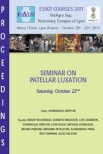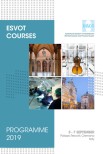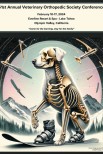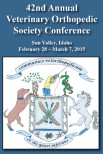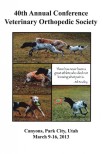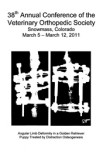Arthroscopy is the gold standard for articular surface examination and is commonly advocated for diagnosing and treating cases of canine elbow dysplasia. Arthroscopy is generally regarded as a low-risk procedure, however there is a paucity of information in the small animal veterinary literature regarding the associated complication rates. In a retrospective study spanning a ten year period, 750 elective elbow arthroscopies were evaluated. Complications necessitating repeat surgery were defined as major, and were documented in 4.8% of dogs. Minor perioperative complications occurred in 17.1% dogs. The failure of arthroscopic treatment necessitating unplanned conversion to arthrotomy was the most frequently encountered complication in this category, having been reported in five percent of dogs. Minor postoperative complications occurred in 10.7% dogs; these included a worsened postoperative lameness (5.5%), severe pain (2.8%), severe swelling (2%), infection (0.2%), and neurapraxia (0.2%). A total of 204 dogs returned for a postoperative re-examination and in seven percent, lameness was more severe than that noted preoperatively. The results of the study show that the major complication rate associated with elective elbow arthroscopy is low, but that the minor peri- and postoperative complication rate is concerning. These findings will assist veterinarians in their preoperative discussions with owners to ensure the achievement of informed consent.
A retrospective study of the short-term complication rate following 750 elective elbow arthroscopies.
Date
2014 Jan 13
Journal
VCOT
Volume
27
Number
1
Pages
68-73
